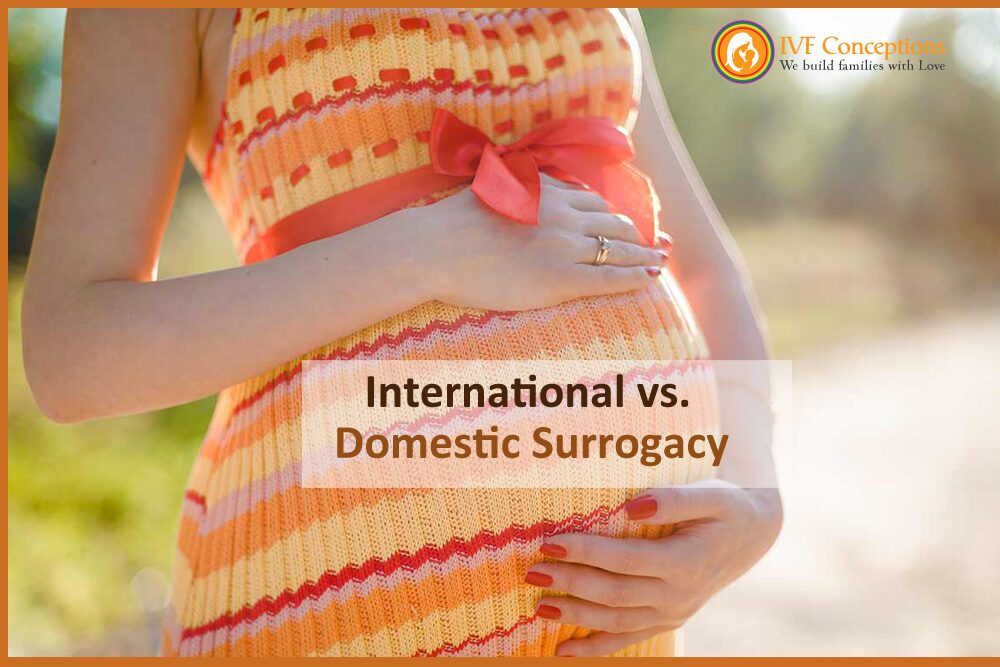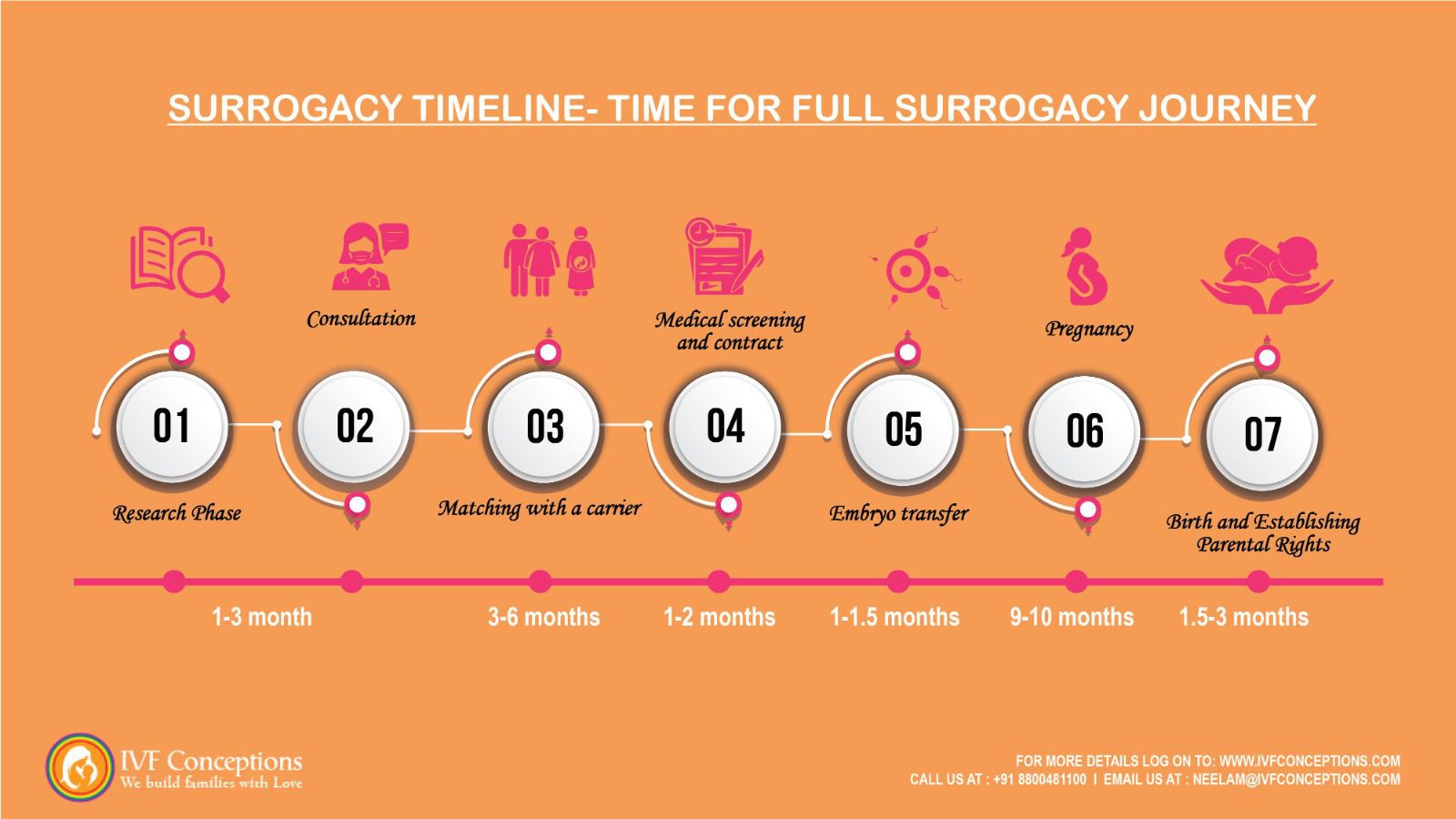
Surrogacy in Delaware: A Comprehensive Guide for Intended Parents
Surrogacy in Delaware is one of the safest and most effective ways in the country to achieve your surrogacy objectives. Surrogacy has been a feasible option in recent years for individuals and couples dealing with infertility or illnesses that make it difficult for them to conceive normally.
Delaware provides a welcoming legal climate for surrogacy agreements and is renowned for its progressive attitude toward reproductive rights. Due to its clear and comprehensive rules that govern surrogacy contracts and safeguard the rights and interests of all parties involved.
Delaware is one of the most surrogacy-friendly states in the U.S. No matter the intended parents’ marital status, sexual preference, or genetic relationship to the child, surrogacy is legal in Delaware for all kinds of intended parents.
In Delaware, surrogates are also permitted to be paid for their services and related costs as long as they adhere to particular rules and procedures.
Begin your surrogacy journey with IVF Conceptions today!
Mobile: +91-8800481100 ( WhatsApp, Line, Viber)
Email: neelam@ivfconceptions.com
Web: www.completesurrogacy.com
Key Highlights Of Surrogacy In Delaware
The state of Delaware makes surrogacy an appealing choice for intended parents by providing a number of significant benefits. The following are the salient features of surrogacy in the state:
- Delaware’s surrogacy laws are well outlined in its legal framework. Legally enforceable surrogacy agreements outline each party’s rights and obligations, ensuring a transparent and secure process.
- Gestational Surrogacy: Gestational surrogacy, in which the surrogate has no genetic ties to the child, is the main type of surrogacy recognized in Delaware. This kind of surrogacy is accepted legally and frequently in the state.
- Delaware is inclusive in terms of eligibility for surrogacy. It accepts same-sex couples, heterosexual couples, and anyone who is infertile for medical reasons. There are no exclusions based on marital status or sexual orientation.
- Parental Rights: Under Delaware law, if the surrogacy arrangement complies with state regulations, the intended parents are generally recognized as the child’s legal parents. This guarantees a seamless handoff of parental rights.
- Medical Examination: In order to verify that they are physically and psychologically fit for pregnancy and surrogacy, surrogates in Delaware must undergo extensive medical examinations. The health of the surrogate and the child are given top priority in these exams.
- Reputable surrogacy agencies that help match intended parents and surrogates are available throughout the state. These organizations are essential in assuring compatibility and providing support along the way.
- The price of surrogacy in Delaware might vary depending on a variety of factors. Surrogacy in Delaware typically costs between $80,000 and $160,000.

An Overview of Surrogacy In Delaware
Surrogacy is a reproductive option that allows individuals or couples who cannot conceive a child naturally to have a child through the help of a surrogate mother. Delaware, like many other states, has recognized the importance of surrogacy in family building and has established clear surrogacy laws to facilitate the process.
Surrogacy Law in Delaware
Delaware surrogacy law is designed to protect the rights of all parties involved in the surrogacy journey, including the surrogate, the intended parents, and the child. These laws ensure that the surrogacy process is legal, regulated, and secure.
Becoming a Surrogate
Becoming a surrogate in Delaware is a noble and fulfilling decision. It’s an opportunity to help intended parents realize their dream of parenthood. Surrogates in Delaware are highly regarded and supported throughout their surrogacy journey.
Gestational Surrogacy
 In Delaware, gestational surrogacy is the most common form of surrogacy. It involves a surrogate who carries a child that is not genetically related to her.
In Delaware, gestational surrogacy is the most common form of surrogacy. It involves a surrogate who carries a child that is not genetically related to her.
This type of surrogacy has become increasingly popular due to its legal clarity and ethical considerations.
The state has a surrogacy law that offers a framework for surrogacy agreements. According to the law, a written contract outlining the rights and obligations of both the intended parents and the surrogate must be signed.
The contract must be signed and approved by a judge prior to the surrogate becoming pregnant.
One of the safest and most effective ways to accomplish your surrogacy goals in the United States right now is through surrogacy in Delaware.
The legal process for intended parents and potential surrogates is clearly outlined by Delaware’s surrogacy laws, making it simple to establish parental rights and safeguard both parties’ interests at every stage.
The “Gestational Carrier Agreement Act,” a set of surrogacy regulations in Delaware, does not recognize traditional surrogacy. As a result, it’s uncertain if this sort of surrogacy is legal.
In any case, because of the possible emotional and legal difficulties that could occur, many surrogacy professionals would advise against taking this route.
By the Delaware Gestational Carrier Agreement Act, a gestational carrier is “not a parent of a child born as a result of a gestational carrier agreement.”
As long as both parties go by the standards Delaware has established for contracts, Delaware has also legalized compensated surrogacy. A contract involving paid surrogacy is enforceable as long as obligations and pay are specified. It is also mentioned that an escrow agency must manage any payment a surrogate receives.
 Surrogacy Laws In Delaware
Surrogacy Laws In Delaware
Understanding the surrogacy laws in Delaware is crucial for both surrogates and intended parents. Delaware surrogacy law clearly outlines the legal requirements and protections for all parties involved.
Legal in Delaware
Surrogacy is legal in Delaware, and the state recognizes gestational surrogacy as the primary method. Traditional surrogacy, where the surrogate is genetically related to the child, is not explicitly prohibited but not recognized in Delaware surrogacy law.
Surrogacy Contracts
Surrogacy contracts in Delaware must adhere to specific legal requirements to be enforceable. It’s essential to work with experienced surrogacy professionals and legal experts to ensure the surrogacy agreement is legally sound.
Pre-Birth orders
You must submit an application for a pre-birth order as part of the surrogacy process to ensure that you are recognized as the child’s legal parents before they are born. You would then have the authority to decide on any legal or medical matters pertaining to your child.
In accordance with Delaware’s surrogacy legislation, the court may determine the parents of a child born through surrogacy prior to birth, with the order taking effect at the time of the child’s birth.
With or without a genetic connection to the surrogate kid, married couples, unmarried couples, and single people might be the intended parents.
How does the legal procedure work in Delaware, and what is covered by a surrogacy agreement?
 All gestational surrogacy contracts made in the state of Delaware must comply with specified restrictions outlined in the state’s surrogacy statutes.
All gestational surrogacy contracts made in the state of Delaware must comply with specified restrictions outlined in the state’s surrogacy statutes.
By law, a surrogacy contract must be signed before the surrogacy medical procedure can start (which many reproductive clinics need anyway).
The signature of the contract must be witnessed by two individuals who are not parties to the deal, and both parties must be represented by independent surrogacy attorneys in Delaware.
Any payment made to a surrogate must be handled by an escrow agent and specified in the surrogacy contract.
Before the surrogacy agreement is finalized, it must be approved and signed by the intended parents, the surrogate, and her spouse (if appropriate). The medical procedure for surrogacy can then start.
When, after giving birth, must intended parents finalize an adoption?
Adoptions after birth are typically unnecessary because it is likely possible for all prospective parents in Delaware to acquire a pre-birth order. However, if the intended parents choose to use a surrogate in another state and that state’s laws do not permit them to get a pre-birth order, they can always come back to Delaware to complete an adoption once the baby is born.
Do second-parent adoptions take place in Delaware? In contrast to a stepparent adoption (if applicable), who would be required to complete a second-parent adoption?
For intended parents who have not yet established their parental rights, Delaware does permit second-parent adoptions. As previously stated, this legal procedure is typically used when intending parents finish a surrogacy in another state and then relocate to Delaware to take advantage of the state’s second-parent adoption laws or, if they are married, to finalize a stepparent adoption if they haven’t already.

How Much Does Surrogacy Cost in Delaware?
The average surrogacy cost in Delaware is between $80,000 and $200,000, but this is only an estimate, and your actual costs may be higher or lower depending on your situation, the agency you select, the surrogate you match with, the medical and legal fees, and other factors.
In Delaware, the following are some of the major cost factors for surrogacy:
| Expenses Type | Cost |
| Agency fees
These cover the costs of the services offered by the surrogacy agency, including assistance, counseling, case management, and services like screening and matching. |
The agency fee is between $20,000 and $40,000, or more.
|
| Surrogate compensation
The sum given to the surrogate in exchange for her time, effort, and sacrifice is known as the “surrogate compensation.” The amount of pay for surrogates can vary based on their background, region, and preferences.
|
In Delaware, surrogates often earn between $35,000 and $40,000 in basic pay, plus additional compensation. |
| Health-related expenses
These cover the price of any fertility procedures, drugs, prenatal care, delivery, and potential problems. The clinic you select, the number of embryo transfers required, the birth method (vaginal or cesarean), and your insurance coverage can all affect the cost of your care. |
The cost of medical care might be as high as $60,000 or more. |
| Legal fees
These costs are incurred in the preparation and review of the surrogacy contract, the establishment of parental rights, the acquisition of a prenatal or postnatal adoption order, and the resolution of any potential legal disputes. The complexity of your case, the state legislation, and the lawyer you choose can all affect the cost of your lawsuit. |
Legal costs may cost up to $20,000 or more.
|
Additional guides for surrogacy in the USA:
Surrogacy In the USA is Made Easy and Affordable.
How Much do Surrogacy Agencies Charge in the USA?
How Much Does Surrogacy Cost in the USA ( 2024)?
Why Should USA Couples Do Surrogacy in Georgia and Europe?
Surrogacy Financing Options For Intended Parents
Why Surrogacy Costs So High And How To Manage It?
Surrogacy In Delaware for Intended Parents
Regardless of their marital status, sexual orientation, or genetic connection to the child, intended parents can pursue surrogacy in Delaware with a good amount of ease and security.
As well as offering assisted reproductive technology (ART) services like in vitro fertilization (IVF), egg, sperm, and embryo donation. Delaware is home to a large number of respectable and well-known fertility clinics.
These facilities can help you create and transfer your embryos to your surrogate mother with excellent success rates and exceptional care.
A robust and supportive network of surrogate mothers who are willing to help intending parents achieve their parental goals also exists in Delaware. Surrogate mothers in Delaware are entitled to fair compensation and benefits for their services, as well as legal representation and defense.

Surrogacy Process in Delaware
The Delaware surrogacy process can be divided into a number of steps, each needing a distinct group of professionals and responsibilities. You can generally anticipate the following as a future parent:
Surrogacy in Delaware normally consists of six steps:
- Contact a surrogacy service or attorney to get started. They can help you with the process and pair you up with a suitable surrogate or intended parents.
- Completing a screening procedure for the intending parents and the surrogate that entails in-home, background, and medical examinations.
- Finding a compatible match based on your preferences and objectives and getting to know one another by phone calls, emails, or in-person meetings
- Finishing the legal procedure, which can entail creating a letter of understanding or a declaration of purpose or signing a surrogacy agreement in another state.
- using fertility drugs, creating an embryo through IVF, and placing the embryo in the surrogate’s womb.
- Preparing for the birth of the child and establishing the parents’ parental rights.
Finding A Surrogate Mother In Delaware
- You can have the opportunity to network with potential surrogates and learn more about the surrogacy process by going to conferences, seminars, or support group get-togethers that are specifically focused on surrogacy.
- Ask your loved ones and acquaintances: On occasion, friends or family members offer to act as surrogates, or they may know someone who is. To see if anyone in your immediate circle has any leads, discuss your goals with them.
- Surrogate-specific online platforms and websites: There are a number of online platforms and websites that match surrogates. These websites make it feasible for prospective surrogates and intended parents to connect and set up profiles. A few well-known websites include Surrogate.com, SurrogateFinder.com, and SurrogacyOnline.com.
- Organizations that connect prospective surrogate mothers and intended parents are known as surrogacy agencies. They typically have a database of pre-screened surrogates and can support you through every step of the surrogacy process, including matching and legal and medical assistance.
International surrogacy guide:
Top 4 cheapest countries for surrogacy
Best Countries for Surrogacy 2024- Top International Destinations
Risks of international surrogacy
Global International Surrogacy Options
IVF Conceptions Surrogacy Prices & Plans ( in 2024)
 Conclusion
Conclusion
In Delaware, surrogacy is more than just a treatment; it’s a significant, life-changing journey that necessitates the collaboration of all parties. By staying informed, seeking assistance when required, and maintaining open lines of communication, you may approach this road with confidence and optimism, knowing that the promise of parenthood is waiting for you at the end.
We want to provide everyone in Connecticut who is considering surrogacy with our constant support and encouragement. Exploring surrogacy is a courageous and intensely personal decision. Although there may be challenges, one has the opportunity to fulfill their parenting dream.
If you’d like to learn more about IVF, Egg Donation, or surrogacy services globally, check out the rest of our website at IVF Conceptions. We offer legally secure and affordable surrogacy consulting services for FREE.
Get in touch for a Free Surrogacy Consultancy:
📲 +91-8800481100 ( WhatsApp, Line, Viber)
Frequently Asked Questions – Surrogacy in Delaware
What is surrogacy, and is it legal in Delaware?
Surrogacy is a legal arrangement in Delaware where a woman (surrogate) carries a child for intended parents who are unable to conceive or carry a pregnancy to term. Surrogacy is indeed legal in Delaware, and there are specific laws and regulations in place to protect the rights of all parties involved.
How can someone become a surrogate in Delaware?
To become a surrogate in Delaware, you should meet certain criteria such as being between the ages of 21 and 40, having given birth to at least one child, being physically and mentally healthy, and having a stable living situation. Additionally, you will need to go through a thorough screening process by a surrogacy agency or fertility clinic.
What are the surrogacy laws in Delaware?
Delaware follows the Delaware Gestational Carrier Agreement Act, which governs surrogacy arrangements. This act outlines the rights and responsibilities of all parties involved, including the surrogate, intended parents, and any other individuals mentioned in the surrogacy contract. It is advisable to consult with a surrogacy attorney to fully understand the legal aspects of surrogacy in Delaware.
What is the difference between a gestational carrier and a traditional surrogate?
A gestational carrier carries a pregnancy created through in vitro fertilization (IVF) using the eggs from the intended mother or a donor, and the sperm from the intended father or a donor.
The gestational carrier is not genetically related to the child. In contrast, a traditional surrogate is genetically related to the child because her own eggs are fertilized by the intended father’s sperm through artificial insemination.
What is the process of surrogacy in Delaware?
The surrogacy process in Delaware typically involves several steps. These include finding a surrogacy agency or fertility clinic, completing the necessary screenings and evaluations as a surrogate or intended parents, matching with the right match, drafting and signing a surrogacy contract, undergoing IVF procedures, and eventually the birth of the child. The entire journey can take several months to a year or more.
What is a pre-birth order, and how does it relate to surrogacy?
A pre-birth order is a legal document issued by a court that establishes the intended parents’ parental rights over the child to be born via surrogacy. It ensures that the intended parents are recognized as the legal parents from the moment of birth, bypassing the need for.
FAQs for Surrogacy in the USA:
What is the process of surrogacy in the USA for intended parents?
The surrogacy process in Delaware for intended parents involves multiple steps, starting with a consultation to discuss your story and questions. Working with an experienced agency Surrogacy provides guidance through milestones like choosing an agency, finding a surrogate, medical screening, and legal contracts.
How much does surrogacy in the USA cost?
The cost of surrogacy in the USA varies depending on the program you choose. The cost of surrogacy starts at $150,000 to $200,000 based on the specific services needed and the compensation of the surrogate mother and egg donor. For low-cost surrogacy, it is advised to consider “independent surrogacy or private surrogacy”, which costs less but requires more time and management.
What are some affordable surrogacy options?
Affordable surrogacy options are:
- Opting for independent surrogacy arrangements.
- Using a surrogate mother within the family or friend circle.
- Considering the international surrogacy countries with affordable, low-cost surrogacy programs like Mexico, Colombia, Argentina, Georgia, and Ukraine.
What are the requirements for becoming a surrogate mother in the USA?
The requirements for becoming a surrogate mother are:
- To become a surrogate mother, you must meet certain criteria.
- You should have delivered a child of your own and be parenting at least one child.
- Uncomplicated pregnancies and deliveries are necessary, as documented by medical records.
- Age requirements are between 21 and 44 years old.
- The Body Mass Index (BMI) is typically no higher than 33.
- Surrogates should be citizens, legal residents, or legal immigrants of the United States.
- medically and psychologically in sound condition.
Can you help us find a low-cost surrogate mother?
Yes, we have been working in the international surrogacy domain for 13 years and have good networks of fertility clinics and surrogacy agencies globally, that are trusted to offer world-class services. We have long expertise and experience in the best and most legal international surrogacy countries.

 Surrogacy Laws In Delaware
Surrogacy Laws In Delaware Conclusion
Conclusion
